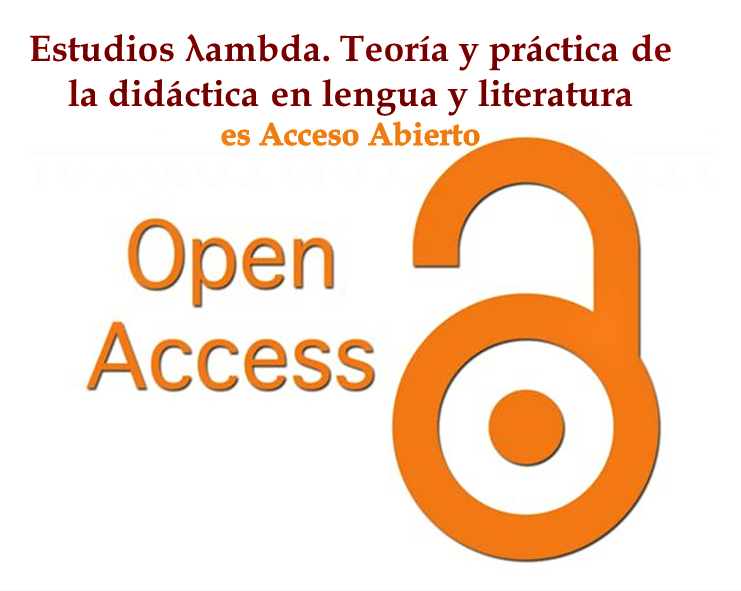λambda Studies. Theory and Practice of Language and Literature Didactics is a digital journal, published continuously every six months, with open access, free of charge and peer-reviewed using a double-blind methodology. The journal is scientific and reflective in nature, with an emphasis on innovation and research related to the teaching of: language and literature, discourse analysis, cultural studies, literacy studies and literary theory. It also includes publications on interdisciplinary research related to the aforementioned topics, as well as the processes of comprehension and production of texts in L1 and L2.
Ethical Oversight Policy
To establish the guidelines of the code of ethics and good editorial practices, the magazine Estudios Lambda. Teoría y práctica en lengua y literatura is governed by Ley Federal de Derechos de Autor de México, and adapts the international standards published by:
- Comité de Ética en la Publicación (COPE 2011 y 2018)
- Guía de Mejores Prácticas para Editores de Revistas Científicas
- Paquete de Recursos para la Ética en la Publicación (PERK 2019), developed by the Elsevier publishing group.
This in order to guarantee transparency both in the publication of contributions and in the associated conflict resolution procedures. In addition, it uses the Ithenticate software to detect plagiarism. All documents received will be reviewed.
The Lambda Studies editorial committee will ensure that all parties involved, authors, peer reviewers and editors adhere to ethical standards throughout the editing process.
Guidelines for:
- For authors
Authors must submit their manuscript in accordance with the Rules for authors established by the journal.
Research misconduct is considered when:
- Fraud is detected, that is, when data or conclusions are published that were not generated by research, experiments or observations, but by manipulation of data or invention.
- Didactic interventions are carried out with intentional manipulation of variables without the informed consent of the participants.
Serious breaches of ethics are considered when:
- Plagiarism is committed, that is, when an author or authors use another work (usually by another author) without permission, credit or recognition. Plagiarism takes different forms: from verbatim copying to paraphrasing without reference (Elsevier 2019).
- An article is simultaneously submitted to more than one magazine or publisher. Also in the event that the article contains substantial parts of another already published. When an article is sent for publication, the author must declare to the editorial committee regarding the articles or previous reports that could be considered as redundant or duplicate publication of the same work. Any of these publications must be referenced in the new article.
- Conflict of interest is detected. Conflict of interest arises when an author (or the institution to which they belong), peer reviewers or editors have financial or personal relationships that could inappropriately influence (bias) their actions. Authors must disclose relationships or reasons that could represent a conflict of interest in the Non-conflict letter.
- Authorship conflicts arise. That is, when there is no agreement on the type of authorship contribution: shared authorship, undeserved authorship, authorship dispute, and phantom authorship.
- Shared authorship is one in which researchers from different disciplines who have contributed to multidisciplinary research participate. In these cases, the order of appearance of the authors must be agreed and indicated in writing.
- Undeserved or honorary authorship is one that is granted without the author having contributed substantially in the design and writing process or without having participated with any important contribution to the intellectual content.
- The authorship dispute arises when a researcher claims total or partial authorship of the content of a published article. The editor must manage this problem by informing the author or authors, requiring them to make a consensual and motivated decision. If this does not occur, the editor must request the intervention of the institution to which the authors belong to resolve the conflict.
- Phantom authorship or denial of authorship consists of not including as an author a person who has contributed substantially to the research or to the writing of the article. It is the opposite case of undeserved or honorary authorship.
- Evaluating pairs
Peer reviewers must:
- Declare conflicts of interest or inabilities
- Strictly adhere to the journal's evaluation process policies
- Respond to requests and submit evaluations on time
- Conduct a rigorous and methodical assessment, as expected, given the level of expertise of the assessing peer
- Respect the confidentiality of the information linked to the editorial process
To know in detail the guidelines for peer reviewers, please consult the following address (in English): http://publicationethics.org/files/Ethical_guidelines_for_peer_reviewers_0.pdf
- For editors
Editors must:
- Ensure transparency of contributions and evaluation and publication processes.
- Guarantee the objective dialogue and confidentiality of the parties involved in the editorial process.
- Respond promptly and respectfully to questions and notifications.
- Guarantee compliance with international standards of ethics, research and publication in all scientific and editorial processes related to the journal.


